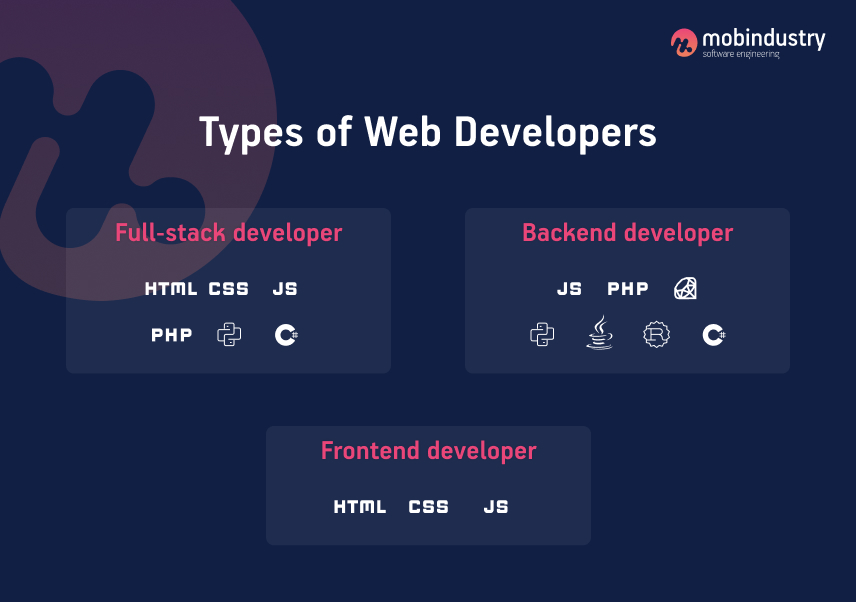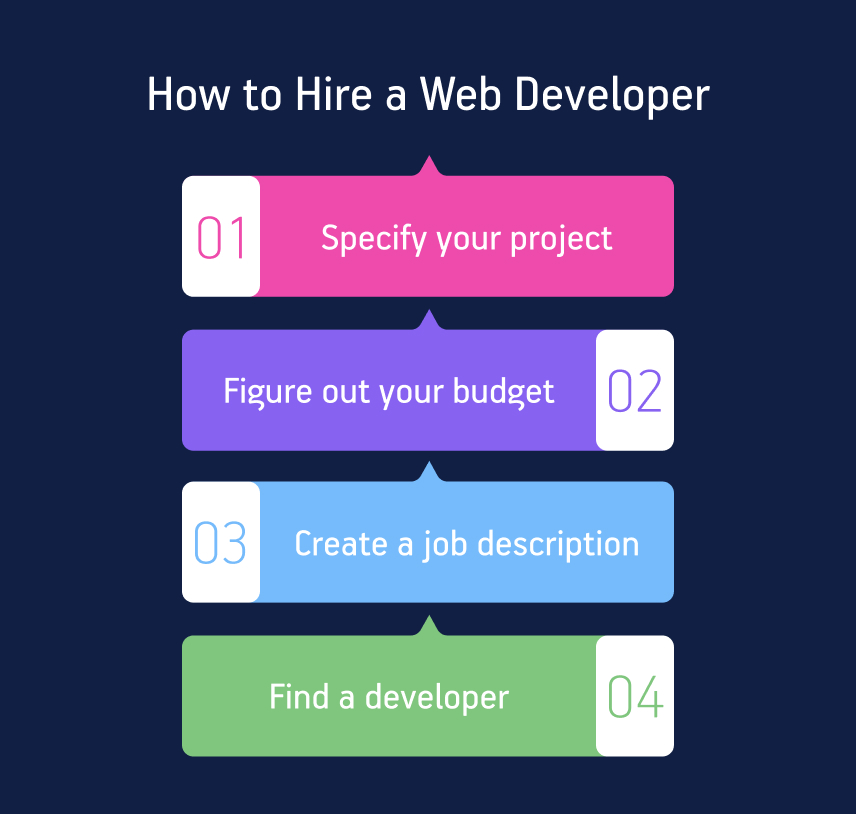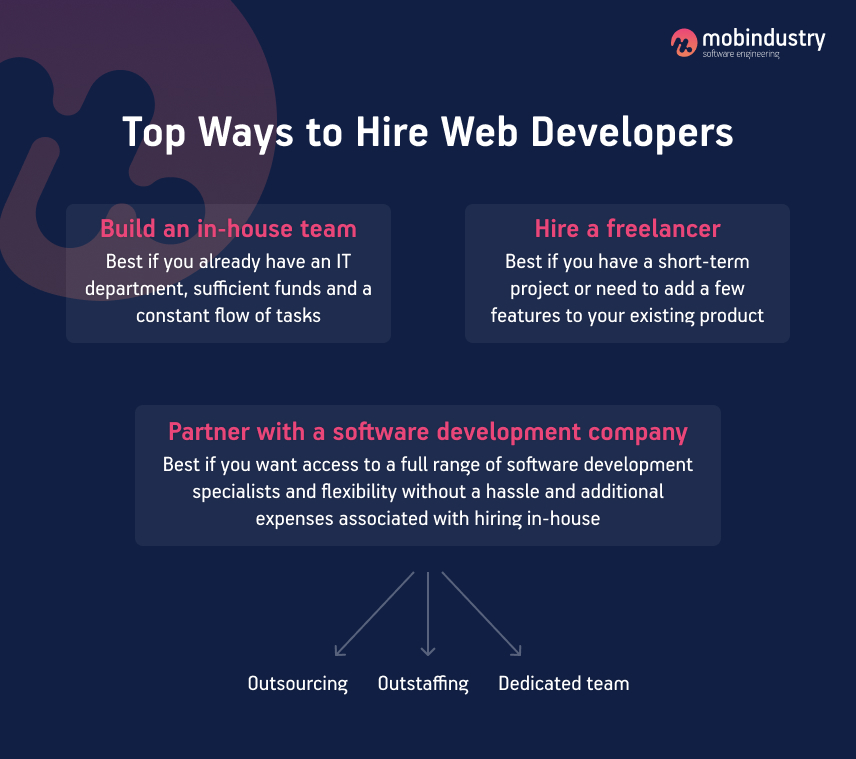How to Find and Hire Web Developers for Your Project
Though it seems there’s no shortage of web developers in the world, hiring them can be challenging. Learn how to find the best developers for your goals and budget and develop your web project with maximum efficiency
Though it seems there’s no shortage of web developers in the world, hiring them can be challenging. Learn how to find a good web developer for your goals and budget and develop your web project with maximum efficiency.
In 2018, there were 23 million web developers in the world. By 2023, their number is expected to reach 27 million. But despite this large number of developers, it can still be challenging to find a good development team for your company.
Despite there being 25 million web developers in the world, finding them is still a challenge for businesses
Whether you need a simple one-page site or a complex web application, you want it to be high-quality, maintainable, and at a reasonable price. Your choice of developer will depend on lots of factors, from your specific demands to your budget.
In this article, I’ll give you a guide on where to find the best web development team for you and how to hire a website developer so that your intellectual property rights are protected.
Types of web developers
Web developers can be classified depending on their skill set and experience. Within each of the following categories, you can find beginner developers, skilled developers, and even technical leads who are able to design and build complex products from scratch and offer the full range of web development services. The skill level of the developers you look for of course will depend on your needs.

Let’s talk about the types of website developers for hire you’ll need for your project.
Frontend developer
The front end of a website is what you see on your screen when you open the website in your browser. Frontend developers are responsible for the look and feel of your website, and they usually specialize in HTML, CSS, and JavaScript.
Frontend developers work closely with web designers, who provide the visual part of the website, making the designer’s ideas a reality in the browser.
Backend developer
The back end is what’s behind the user interface. It’s responsible for your website’s architecture, business logic, data handling, and everything else that makes your website work.
Backend developers know languages like:
- PHP
- Ruby
- Python
- Java
- Rust
- C#
- JavaScript
If you want to create a website from scratch, you’ll need a backend developer, especially if your product is complex and requires a reliable and durable architecture design.
Full-stack developer
A full-stack developer is someone who can develop both the front end and back end of a website or a web app. Often, full-stack developers’ knowledge isn’t as deep as that of frontend or backend specialists. However, it’s possible to find a good developer who will be well versed in both server-side and client-side development.
Such specialists will naturally charge more, so you should be prepared for that. But because you can have one person do everything, you’ll need to spend less time on management.
Depending on your specific needs, the size of your project, and your deadline, you may need several web developers. The best choice for complex web applications is to hire both frontend and backend developers.
How to understand what kind of developer I need
It’s not easy choosing a developer: not only there are many types of web developers, they also use different technologies and languages in their work. How do you choose one?
The easiest way to make a choice is to have an IT consultation with a product development specialist that has a technical background. We at Mobindustry provide this type of consultations for our clients separately or as a part of the discovery phase.
During these consultations, our CEO who is a former developer, and a web tech lead analyzes your business needs, your budget, and requirements, to pick the perfect set of skills your web developer needs for your particular project. You can then use this set of requirements to find a website developer for your team.
How to hire a web developer
Now that we’ve established the types of developers, let’s find out how to hire them. The following instructions are valid for both frontend and backend developers.

Step 1. Specify your project
If you’re looking for web developers, you probably already have a vision for your project, or perhaps you even have a ready product that you want to change or maintain. To find the perfect website developer, you need to specify your business needs and figure out which skills your developers should have.
The size and complexity of your project will influence your hiring decisions the most.
- A simple web project is usually a website without any complex functionality. It typically has contact forms, CTA buttons, automated subscriptions, and so on. Such projects include both landing pages and full-on business websites that don’t have any complex functionality.
A simple web project can also mean that you just need to add new pages, features, buttons, and simple functions to your existing website.
- A medium-sized web project requires more time and skills, as it often involves developing dynamic web apps, online shops, and other projects that need to be integrated with third-party services like CMSs, CRMs, databases, and chatbots.
- A large web project is a complex system that uses cutting-edge technologies, cloud integrations, and multiple servers and databases that need to be protected with extra attention. Such projects include social media platforms, FinTech applications, blockchain platforms, and other types of software.
Apart from your project’s size, you should also specify your vision and the features you’d like to implement.
Step 2. Figure out your budget
The cost of web development can vary dramatically depending on many factors, from your hiring strategy to the hourly rate of your developers along with their location and skills and the scope of work.
Do your research and figure out how much it usually costs to implement a project of your type.
Step 3. Create a job description
To create a job description, you need to describe your project vision and formulate what skills your ideal developer should have. If you don’t know what technical skills are needed to implement your product, it’s a good idea to consult with someone who has relevant technical expertise.
This can be an acquaintance or a software development firm that provides consulting services. After a consultation, you’ll know what team to look for and how to formulate your product vision using technical language.
Step 4. Find a developer
There are many ways to find and hire a developer. Let’s talk about what options you have when it comes to recruiting web developers, and then we’ll discuss how to find the perfect match.
Top ways to hire web developers
Where to hire a web developer for your project? When it comes to hiring a website developer, you have three options:
- Build an in-house team
- Hire a freelance website developer
- Partner with a web development company
There’s no one-size-fits-all solution, and your choice should depend on your goals, budget, deadlines, and other individual factors. Let’s review all three options and analyze them in detail so you can make an informed decision.

Build an in-house team
Building an in-house IT department is a good choice for large companies with big products that need constant attention, changes, and maintenance. With an in-house team, you have maximum control over your development process because all your developers are close to you and available for communication.
However, hiring developers in-house is challenging and costly because you need to find them and provide competitive conditions. Because developers are so in demand, tech companies do practically everything to hire and retain their specialists, so you’ll have to put significant effort into doing the same.
When building your in-house team of web developers, you’ll need to pay for:
- Human resources overhead
- Salaries
- Bonuses
- Taxes
- Equipment and work space expenses
You’ll also need to take care of salary reviews, training, and so on, just like for any other employee. And if a developer decides to leave, you’ll need to spend time and money again to find a web developer and hire them.
You’ll also need to find a reliable way to assess developers during interviews, and if you don’t have tech expertise in your company yet, that may be tricky.
Let’s sum up the pros and cons of hiring a web developer in-house.
The pros and cons of hiring a web developer in-house
- Full control of the project, as the developer is always nearby if they work in the office
- Communication within the team is easy, with no language or cultural barriers
- You need to handle the whole process of hiring an employee, from HR tasks and taxes to setting up a workplace, providing equipment, and paying a salary, benefits, sick leave, vacations, and so on
- Your in-house developer can leave, in which case you’ll need to find a replacement fast and invest in web developer recruitment all over again
- You’ll have a narrow talent pool due to location restrictions
- If you’re a small or midsize company, it will be hard for you to compete for top talent with big companies that already have IT departments
Hire a freelance web developer
Hiring freelancers used to be risky, but because of so many platforms that try to mediate the relationship between clients and freelancers, this option has become more widespread and safer.
Hiring a freelancer is great for small companies that can’t afford or don’t need to hire a web programmer in house. Looking for freelancers gives you access to a large pool of specialists of all skill levels and with all degrees of experience and expertise from all over the world. You can find a web developer for practically any budget, as their hourly rate often depends not only on their experience but also on their location.
How to find a website developer? Look on freelance websites. Platforms on which you can find great web developers include:
- Upwork
- Fiverr
- TopTal
- Pilot
- YouTeam
- Moonlight
Hiring a freelancer is great if you have a small project, but one developer won’t be enough to build a competitive product. You’ll also need other team members like UI/UX designers, QA specialists, a project manager, and so on. Hiring all of these specialists as freelancers, however, will make management crazy. You may need to use a freelance management system for making it less crazy
Let’s sum up the pros and cons of hiring a freelance web developer.
The pros and cons of hiring a freelance web developer
- Large pool of talent from anywhere
- Pay only for what you get: no need to worry about a regular salary, bonuses, a workplace, sick leave, etc.
- A freelancer platform can help you choose a developer through reviews and ratings
- A team of freelancers is hard to manage
- A good specialist still won’t be cheap
- You risk exposing your company’s or customers’ confidential information
- You need to spend time and resources finding new freelancers if your current specialist abandons your project
Partner with a software development company
Hiring a web agency gives you all the pros of freelancers without all the cons of in-house hiring. There are two ways you can hire developers from a software company: outsourcing and outstaffing.
Outsourcing
Outsourcing companies handle everything from HR tasks and training to taxes, equipment, salaries, and skill reviews. All you need to do is explain what your project is about. An outsourcing company will provide you with all the professionals you’ll need for your project, from frontend and backend web developers to project managers, QA specialists, and business analysts.
As a client, you’ll only pay for the hours put into your project. You’ll also keep all the rights to deliverables, and your corporate information can be protected by an NDA and a contract that stipulates penalties for violations.
Outstaffing
If you want to handle all the management yourself, or if you already have a development team you want to expand, outstaffing is for you. According to the outstaffing model, you hire a developer for a project, add them to your existing team, and pay for the amount of hours they work. You can book a developer for any amount of time you need and be sure you’ll always have a developer to rely on.
Outsourcing can come in different forms, and it’s suitable for any company, from startups and small businesses to large corporations and enterprises. The cost of outsourcing depends on an outsourcing company’s experience and expertise but also on the company’s location.
Often, companies from Eastern Europe have a great balance of quality and price. Many businesses choose to outsource to save money for other needs like marketing while getting a product of the same quality they would get if they worked with developers in their home country.
Let’s sum up the advantages and disadvantages of outsourcing and outstaffing.
The advantages and disadvantages of outsourcing and outstaffing
- Pay only for the code delivered. Everything else such as workspaces, equipment, bonuses, salaries, HR overhead, and taxes is handled by the outsourcing company.
- Widen your pool of candidates and get an opportunity to hire a dedicated web developer from any country and for practically any price.
- Hiring from a country with a lower cost of living allows you to save up to 70% of your budget.
- You’ll be protected by a contract and an NDA, so you don’t have to worry about the outsourcing company leaking your private information or abandoning your project.
- You can expand your team fast if you need more developers.
- You can hire both a full-time developer and a part-time developer
- Outsourcing companies have all kinds of supporting specialists such as business analysts, testers, and managers.
- Because you’ll be working with a remote team, you might have problems with communication due to time zone and cultural differences.
To make sure your communication will be great during development, I advise you to interview your potential partners and speak directly with developers, project managers, and QA specialists that will work on your project.
Finding a web developer in-house or finding freelancer developers is quite straightforward: You need to interview them or look for reviews. In-house developers can be found on LinkedIn or hiring sites, while freelancers usually work on freelance platforms. But if you’ve decided that outsourcing is the best option for you, how to find a good web development company and what to look for when hiring a web developer?
How to partner with a good web development company
Step 1. Shortlist vendors
The first step is to find potential web development partners. There are a few ways to do that effectively:
Word of mouth. Аsk for recommendations from your partners and acquaintances who have already used outsourcing services for their web projects.
Listings. Platforms like Clutch and GoodFirms give access to honest reviews about web development companies. Use them to find out more about the projects a company has completed.
Blog. Many web development companies showcase their expertise on their blogs. You can simply search for something you’re interested in, such as “How much does it cost to create an eCommerce website?” and find developers’ websites with expert content.
Portfolio. Usually, you’ll also be able to look at a portfolio on a vendor’s website. Make sure your potential vendor has experience creating similar products to yours.
Step 2. Tell potential vendors about your project vision
You can leave your contact information in the lead form on a vendor’s website or contact them directly through email and outline your project vision. You can also create a request for proposal to quickly get the most vital information that will help you narrow down your shortlisted vendors.
Step 3. Get a rough estimate
After you briefly discuss your project vision with a vendor, they can provide you with a rough estimate by telling you the budget range in which your project will lie. A rough estimate is another way for you to choose the best vendor. Ask your potential partners for more information on their experience so you’re sure to get a nice price/quality balance.
At this point, you should also sign a non-disclosure agreement (NDA), as you will be discussing your project in more detail.
Step 4. Conduct a technical interview with developers
To make sure you’re working with professionals and that you’ll get high-quality code you won’t need to fix elsewhere after delivery, you can check out web developers’ technical skills of web developers.
If you don’t have the technical expertise to be able to accurately assess developers, I recommend involving a third-party specialist you trust who can confirm a developer’s skills.
Step 5. Get a detailed estimate
Now that you’ve confirmed that your potential vendor is a web development professional and that you can communicate comfortably, you can start to discuss your project in detail.
At this point, I advise you to start the discovery phase of your project. During this phase, you will define all the features you’ll need in your web product, your technology stack, third-party services, integrations, and so on. This planning stage will allow you to get a clear plan and will also let developers estimate the whole development process so you can get a detailed estimate of how much time development will take and how much it will cost.
Step 6. Sign a contract
If the final estimate is suitable for you, it’s time to sign a contract that will protect you and your vendor and ensure that your project is delivered on time and within budget.
Which option is best for you?
Let’s sum up all the options you have for successfully developing your web project.
Hire an in-house web developer
If you already have an IT department or you have funds to build a team from scratch. For this, you’ll need competitive working conditions and enough tasks to fill the day. Usually, in-house developers are most useful for companies with large web products that require constant changes, maintenance, and support.
Hire a freelance web developer
If you just want to make a few changes to your current website or web app — for example, to add a couple of features, buttons, and so on. You can also hire a freelance developer for a small project like a simple business website.
Partner with a web development company
If you need to develop complex web software that will require a team. A web development company will be able to help you choose technologies, develop a UX strategy, select a monetization strategy, and integrate your new software into your current business processes.
You’ll also be able to expand or downsize the team at any moment when working with a web development company, which will help you better regulate your budget and development timeline.
As you can see, there’s no perfect solution, and your decision should depend on your business needs and resources.
Web development budget — what to expect?
The cost of hiring a web developer primarily depends on your hiring strategy — are you planning to hire an in-house or freelance developer, or are you going to partner with a software development agency? If you’re planning to hire an in-house developer, your local market will define the cost of their monthly salary.
Hiring a freelancer will give you more options, but you will also need to pay a platform fee, if you want your deal to be secured by a third-party service. Freelance developers’ hourly rates are very different, but high-end devs with lots of great reviews and vast experience will probably charge no less than developers in your country.
Now, partnering with an agency can also have quite different costs. Primarily your budget will depend on their location. For example, while developers in the US charge $80-150 per hour, Ukrainian web developers with the same level of expertise charge $30-$60 per hour, just because of the difference in cost of living.
Go to multiple agencies and don’t hesitate to ask for a quote, so that you can make the most informed and cost-effective decision without sacrificing the quality of your product.
How can we help you hire a web developer?
At Mobindustry, we create web apps and websites of any complexity and provide all types of IT specialists for high-quality software development:
- Web developers
- Architecture engineers
- DevOps engineers
- QA specialists
- Business analysts
- Project managers
- UI/UX designers
- Marketers
Our web developers have over 3 years of experience, and can build apps of any complexity. Moreover, you can hire a web developer for any period of time and according to any cooperation model. For example, if you’d like to handle management yourself, and you only need one web developer in your team, you can use the outstaffing model. This way, you’ll “lend” a developer for any period of time, and they’ll become an organic part of your team. If you need other supporting specialists like QA engineers, project mangers and web designers, I’d suggest an outsourcing model.
If you have any questions about how to hire a good web developer, feel free to contact us.

